Are Arab Oil kingdoms and China Attracted to Golds Glitter?
Commodities / Analysis & Strategy Nov 25, 2006 - 10:11 PM GMTBy: Gary_Dorsch
American political history has repeated itself again. Since World War II, whichever political party controlled the White House during mid-term Elections has lost an average of 6 Senate seats and 30 seats in the House of Representatives. On November 7th, it was the Republicans’ turn to endure a thumping, losing control of Congress to the Democrats for the first time since 1994.
Just a few days earlier, US Labor Apparatchniks had revised their originally reported 128,000 increase in August payrolls into a gain of 230,000 jobs, and September’s 51,000 increase was tripled to a 148,000 gain. The change for the two months combined was the biggest upward revision since July and August 2000. That sent the US jobless rate 0.2% lower to 4.4% of the workforce, a 5-year low.
However, the glowing jobs report, a 12,000+ Dow Jones Industrials, inflated 401-k’s, and an 86 cents per gallon plunge in gasoline prices since August, could not brainwash enough US voters on Election Day. The GOP had wandered too far from its commitment 12-years ago to clean up corruption, shrink the federal government and slash irresponsible spending. Anger about America’s war in Iraq, and frustration with the Bush administration’s reckless trade polices with China, trumped the doctored employment stats and the wealth generated on Wall Street.
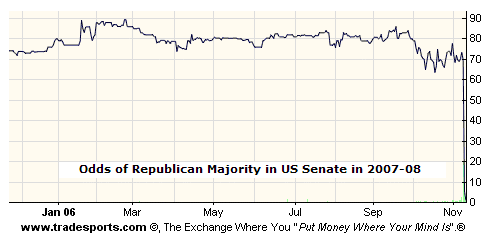
A Newsweek poll showed that 48% of registered US voters would generally like to see a Democrat elected to the White House in 2008, compared to 28% who want a Republican. Such hypothetical polls are likely to narrow significantly by November 2008, but already the Persian Gulf oil kingdoms foresee major chaos and instability in the region, and Beijing is warning Congress to keep its hands off protectionist legislation concerning China’s massive trade surplus with the US.
Saudi Princes Rattled by Democrats, Shifting into Gold
Saudi princes, who control 70% of the stock market in Riyadh have been bailing out of local stocks and moving funds into Gold since early October. The Saudi elite are worried that Democrats could hasten an American withdrawal from Iraq. Defense chief Donald Rumsfeld’s departure could well be a first move in that direction. Signaling a broad shift in his Iraq policy, President Bush on Nov 11th described his new pick for defense secretary, Robert Gates, as an “agent of change.”
The Democratic chairman, Howard Dean, says Congress will keep up the pressure for change in Iraq. “Americans across the country made it clear that they want a new direction in Iraq and in the war on terror.” Sen. Carl Levin, a Michigan Democrat and the next probable chairman of the Senate Armed Services Committee said, “The first order of business is to change the direction of Iraq policy. The American presence was not open-ended, and that, as a matter of fact, we need to begin a phased redeployment of forces from Iraq in four to six months,” Levin said on Nov 12th.
The man who is about to be isolated in the White House is Vice President Dick Cheney, the last neo-con left. Robert Gates, James Baker, and Brent Scowcroft, have been called in for strategy on exiting Iraq over the objections of VP Cheney. But an abandoned Iraq could be seen as a major victory for Islamic insurgents, embolden Iranian and Syrian kingpins, lead to a full-blown civil war in Iraq, and future al-Qaeda or Hizbollah attempts to overthrow the Saudi kingdom.
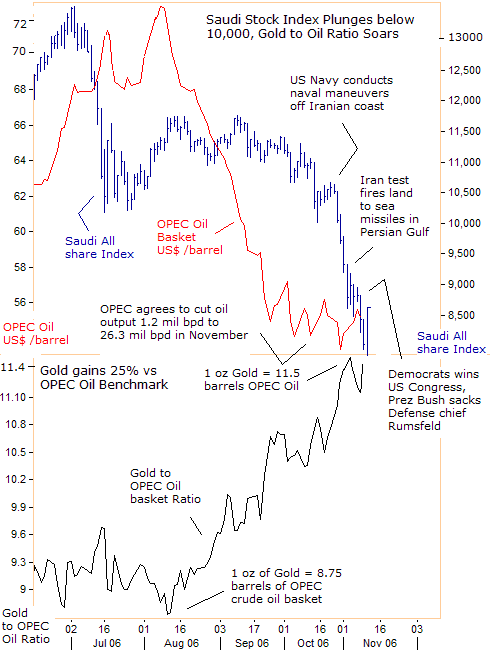
Saudi Arabia's interior minister on Nov 12th called Iraq a major base for terrorism, a sign of growing concerns in the oil-rich kingdom over its violence-plagued neighbor. “There is no doubt that Iraq now forms a main base for terrorism," said Saudi Interior Minister Prince Naif. “The situation in Iraq is deteriorating daily, and the country has become a threat in the region,” he warned.
While stock markets around the world are climbing to 5-year or new record highs, Saudi blue chips plunged to the 8000 level on Nov 11th, their lowest close in almost 20-months. The sudden collapse below the psychological 10,000 level, sent shockwaves through other Gulf bourses where investors are nervous over Iran’s escalating nuclear weapons program, the Shiite revolution moving across the Middle East, and the slide of OPEC’s benchmark oil price to below $60 a barrel.
Since October 29th, the Saudi All-share Index has plunged 25%, and the average P/E has fallen to 14 from around 40 times earnings at its peak in February. New listings in Saudi Arabia are also taking a hit as the Arab world’s largest stock market posts its sharpest decline since losing half of its capitalization between February and May during a region-wide stock market crash.
Proving its mettle as a safe haven in dangerous times, gold has climbed steadily against the price of OPEC’s benchmark crude oil prices from 8.75 barrels in early August to a high of 11.5 barrel last week. Gold traders in London, New York, and Tokyo, have noticed that gold diverged from its tight linkage to the crude oil market over the past few weeks, and the phenomena might have its origin in the Gulf.
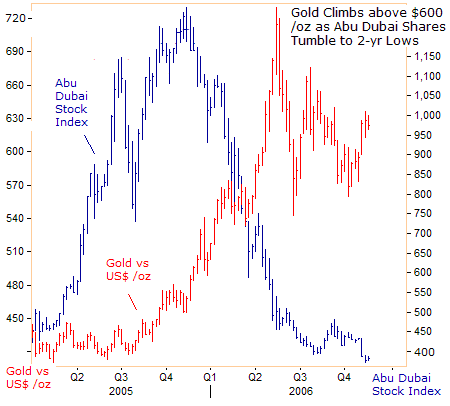
Abu Dubai’s stock index fell below the 400-level to its lowest close in nearly two years as investors sold shares in the largest companies across the Gulf in response to a slump in Saudi Arabia. Qatar’s market fell to its lowest close since Jan 2005. Persian Gulf bourses are also nervous about US-led naval maneuvers off Iran’s west coast that included warships from Australia, Bahrain, Britain, France, and Italy.
Gulf bourses were pounded on November 3rd, when Iran’s Revolutionary Guards fired land-to-sea and sea-to-sea missiles into Gulf waters. “We have improved the range of our missiles to 170 kilometres (105 miles). This will bring the entire Persian Gulf from the Straits of Hormuz and most of the Sea of Oman within range,” said Revolutionary Guards deputy naval chief General Ali Fadavi.
Iran said it fired its longer-range Shahab-3 ballistic missile for the first time, which has a range of up to 2,000 kilometres (1,200 miles), sufficient to threaten US bases in the Gulf, Tel-Aviv, and parts of Eastern Europe. The next day, on November 4th, six Arab states including Algeria, Egypt, Morocco, Saudi Arabia, Tunisia and the UAE said they want to acquire the technology to unlock the secrets to the atomic bomb.
The specter of a nuclear arms race in the Middle East is linked to the failure of Europe and Washington to adopt any meaningful measures that can block Tehran from acquiring nuclear weapons. However, there are reports from Moscow, that the Bush administration is offering Russia entry to the World Trade organization, in return for the Kremlin’s approval of sanctions against Iran.
What’s Behind the Plunge in Oil prices?
Nearly $15 per barrel of the plunge in oil prices was linked to the evaporation of the Iranian “war premium”, after traders gave up on ideas of a US or Israeli air strike on Iran’s nuclear facilities. UN Security Council members have been dithering for months over divisions over a text, calling for sanctions against Iran, with no agreement in sight. Bush toned down his war mongering rhetoric with Tehran, unwinding the “fear factor” that inflated $15 / barrel into oil prices earlier this year.
Also weighing on oil prices, US crude inventories are 16.3 million barrels above year-ago levels, and 10% above the average for the last five years, while heating oil supplies are 18.1 million barrels higher. On October 25th, British Petroleum said its recoverable oil reserves in the Caspian Sea had risen to 6.5 billion barrels from 5.4 billion. The Caspian fields are the main source of crude oil for the BP-led Baku-Ceyhan pipeline, which will eventually pump more than 1 million bpd from Azerbaijan to the Turkish Mediterranean coast in 2007.
On Nov 15th, OPEC noted oil stocks in industrialized countries were at their highest level since November 1998, which could set the stage for further precipitous price falls next year when the northern hemisphere winter ends. “The continuation of above average stock levels may point to a further imbalance in supply /demand fundamentals.” OPEC said.
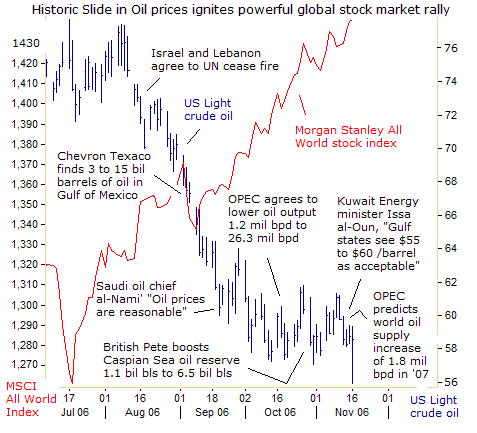
OPEC reckons world oil demand will grow 1.33 million bpd to 85.58 million bpd in 2007, mostly due to stronger demand from China. At the same time however, demand for OPEC oil is expected to fall as new non-OPEC supplies, mainly from Russia and the Caspian, enter the market. OPEC sees supply from rival producers growing by 1.8 million bpd to 53 million bpd next year. “This indicates a shortfall in the demand for OPEC oil in 2007 of around 700,000 bpd,” OPEC said.
Crude oil was rattled on Nov 15th, after Kuwaiti Energy Ministry Undersecretary Issa al-Oun said Gulf OPEC producers believe US oil prices between $55 and $60 a barrel are acceptable and OPEC would act to defend that range. “The Gulf Cooperation Council states see oil prices between $55 and $60 a barrel as an acceptable level but if they start to decline then there should be action,” he said.
Gulf oil ministers have carefully avoided mentioning a target price for their oil, and Nymex oil traders had assumed that OPEC was defending $58 to $62 per barrel. But OPEC delegates say top world exporter Saudi Arabia prefers a level of $50 for OPEC’s basket of crude. That would equate to about $55 for US crude oil.
The latest 30% slide in crude oil prices from the record $78.40 /bl set on July 14th has energized global stock markets, which climbed to record highs last week, as measured by the MSCI All-world index. The global economy is growing 5.1% this year, after expanding 4.9% in 2005 and 5.3% in 2004. The world has not enjoyed a sustained period of growth faster than 4% since the early 1970’s.
However, the latest plunge in crude oil prices might be signaling a significant slowdown in global economic growth in 2007. “A further correction in the housing market could lead to an even sharper slowdown in the US economy and have spill-over effects abroad,” warned IMF Managing Director Rodrigo de Rato on Nov 18th. The US economy slowed to an annualized 1.6% growth rate in Q’3, the slowest since the first quarter of 2003. Housing starts in the US tumbled 14.6% in October to the lowest level in more than six years, and were 27.4% lower from a year ago.
Beijing Disturbed by Democrats, Signals shift from US$
The news of a Democratic sweep of Congress lifted the price of gold by nearly $20 per ounce on October 8th. Democrats are likely to take aim at China’s mushrooming trade surplus with the US, which has skyrocketed from $4 million per month in 1976 to $4 billion per week in 2006. There could be greater Congressional pressure on Beijing to push up the value of the yuan against the US dollar, putting China’s portfolio of $700 billion of US bonds at risk from currency devaluation.
On October 31st, Democratic Senator Hillary Clinton suggested US efforts to get China to move toward a more flexible exchange rate had been in part frustrated by the leverage given to the Chinese through their huge ownership of US Treasury debt. “How do you get tough on your banker? We have to hope every morning that Beijing and other nations will continue to buy our debt instruments. The trade deficits with China give the US a weakened hand in global trade and economic diplomacy.”
On November 4th, Senator Jack Reed (D-RI), the ranking Democrat on the JEC, Rep. Carolyn Maloney (D-NY), Senior House Democrat on the JEC, and Rep. Barney Frank (D-MA), ranking Democrat on the House Financial Services Committee, released the report, “Relying on the Kindness of Strangers: Foreign Purchases of US Treasury Debt.” Key findings from the study include the following:
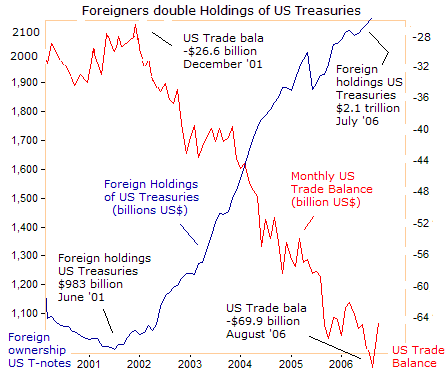
“At the end of fiscal year 2005, 42.1% of the public debt of the United States was held by foreigners. That foreign ownership share rose by 11.8% just since 2001 and will be higher still when the data for 2006 are released. Foreign ownership of Treasury securities more than doubled from $1.0 trillion in January 2001 to $2.2 trillion in August 2006. China’s holdings rose 450% to $339 billion. The OPEC nations have doubled their holdings to over $100 billion in the past two years.”
“If the United States does not begin to take steps to reduce its unsustainable dependence on foreign borrowing in an orderly way, there could be a run on the US dollar and that could precipitate an international financial crisis and a sharp increase in interest rates,” the report warned.
Trying to pre-empt a Democratic showdown on China’s $210 billion per year trade surplus with the US, Beijing issued a veiled threat that it might stop buying US bonds, thus exerting upward pressure on US mortgage rates. “China has a clear plan to diversify its $1 trillion foreign exchange reserves and is considering various options to do so,” said Chinese central bank chief Zhou Xiaochuan on Nov 9th.
Zhou’s signal of a possible shift away from US dollars was in quick reaction to harsh rhetoric from Rep. Charles Rangel, a New York Democrat, who wants to get tougher on trade with China. “I don’t think the Bush administration has taken up any trade issue with the Chinese. We should insist if they are going to trade with us it’s going to be fair trade. We have to protect American jobs,” he said. Under the Bush administration’s trade policies, 3.1 million US manufacturing jobs have been lost.
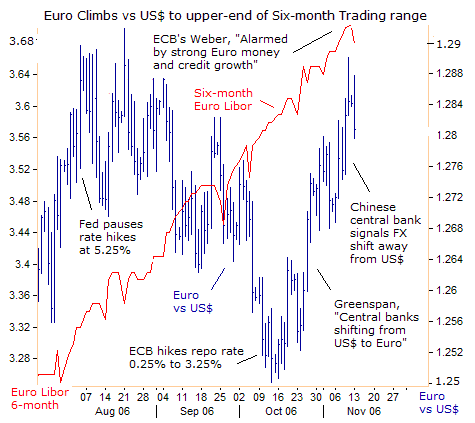
“Diversification includes currencies, investment instruments, including emerging markets,” Zhou warned the next day. Asked if Beijing is buying gold, Zhou would only say, “That’s a separate thing.” In a knee-jerk reaction to Zhou, the British pound and Euro rose to the upper end of their six month trading ranges last week, and both currencies are benefiting from rising short-term interest rates.
At the end of 2005, central banks held FX reserves of around $3.5 trillion, with 15% invested in gold. Gold accounted for 70% of US reserves, 50% of ECB reserves, 40% held by Switzerland, 4% by India, 2% by Japan, and around 1% by Brazil, China, Hong Kong, Korea or Malaysia. The big players are China and Japan which hold a combined $1.9 trillion of FX reserves, followed by Russia’s $265 billion. Ironically, the central banks with the largest FX reserves own the least amount of gold.
In the 1990’s, the prevailing question was, what if European central banks reduce their gold holdings to 10% of their reserves? Now, the question is what if Asian central banks increase their holdings to 10% of their reserves? said Philipp M. Hildebrand, member of the Swiss National Bank, on June 26th, 2006. But to what extent would the People’s Bank of China shift into other currencies or gold, while shunning the US dollar, given its dependence on exports to the US to keep its economy humming at 10% per year?
European Central Bankers to Resist Gold’s Advance
Gold’s latest surge from as low as $560 per ounce on October 6th, to as high as $635 per ounce on November 8th, disturbs central bankers in Europe. They don’t want to see gold become a one-way bet to the upside that could signal a collapse of the US dollar, or higher global inflation on the horizon. The first line of defense against gold’s advance is “Jawboning.” The second option is European central bank gold sales. The third and least palatable option is higher short-term interest rates.
European central banks may have dumped far more gold on the markets over the last three weeks of September than officially reported, accounting for the sudden plunge in prices below $600 per ounce that stunned traders. Barclays Capital, one of the world’s top-3 gold traders, said Europe’s banks had sold an extra 100 tons from reserves in a rush to meet a quota deadline on September 26th, but had done so by selling through forward contracts that disguised the effect.
The huge sales would help explain gold’s brutal fall from 500 Euros an ounce in early September to as low as 440 Euros /oz on October 3rd, compounded by hedge fund liquidation of crude oil contracts. The central banks had reported sales of just 393 tons of gold for the fiscal year, far below the 500 annual ton limit agreed under the Washington Accord, an agreement by 15 central banks in Europe.
However, Russia’s central bank says it wants to raise the gold share of its $267 billion of FX reserves from 3% to 10%, a move that would soak much of global mine supply. For gold bugs, it’s a healthy sign that gold absorbed the European bank sales in September in impressive fashion, and then rebounded to levels that prevailed before the dumping by the Bank of France and others. In the past two weeks, 3 Euro zone central banks have sold gold in exchange for 290 million Euros.
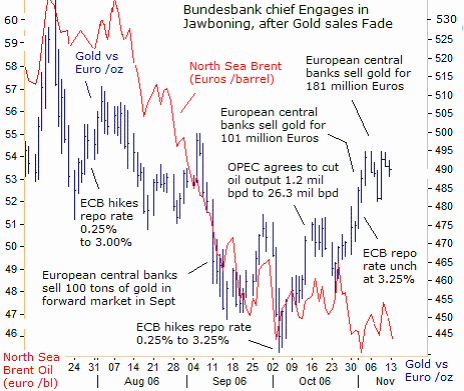
Also, the chart above highlights gold’s recent break away from the tight grip of North Sea Brent crude oil. Once again, the divergence is probably linked to gold accumulation by nervous Persian Gulf banks and traders. For good measure, gold traders are also betting that OPEC can succeed in stabilizing US crude oil prices near $60 per barrel, eliminating a potential risk to the downside.
For more than a year, gold traders have been waiting for a 1% shift in the Bank of China’s FX reserves from US dollars into gold, which could soak up much of the European Central Bank gold sales. At the end of 2005, central banks held FX reserves of around $3.5 trillion, with 15% invested in gold. Gold accounted for 70% of US reserves, 50% of ECB reserves, 40% held by Switzerland, 4% by India, 2% by Japan, and around 1% by Brazil, China, Hong Kong, Korea and Malaysia.
Ironically, the central banks with the largest FX reserves own the least amount of gold in their portfolios. In the 1990’s, the prevailing question was, what if European central banks reduce their gold holdings to 10% of their reserves? Now, the question is what if Asian central banks increase their holdings to 10% of their reserves? said Philipp M. Hildebrand, member of the Swiss National Bank, on June 26th, 2006.
Recognizing gold’s 10% recovery towards 500 Euros per ounce, Italy’s central bank chief Bini Smaghi is now warning that the European Central Bank will adopt the unpalatable option of tighten its monetary policy further, to keep global inflation in check. “What counts in evaluating monetary policy is not today's inflation but the medium-term outlook. It’s clear that with an economy that grows at the current pace of 2.7% and with inflation above 2% for the coming months, an interest rate of 3.25% might not be adequate," he said.
“To keep it at this level would mean too accommodative a policy that would increase the inflation outlook well beyond 2%, forcing us to take a highly restrictive move,” Smaghi said. But already, a long line of European finance ministers are speaking out against further ECB rate hikes beyond 3.50% for 2007, to help preserve the big gains on European stock markets so far this year.
Federal Reserve Handcuffed on Interest rates, Turns to Jawboning
Now that crude oil prices are trying to stabilize near $60 per barrel, in the wake of cutbacks in oil output by the OPEC cartel, Fed officials are jawboning about a resurgence of inflation in 2007. Chicago Fed chief Moskow warned on November 6th, “My current assessment is that the risk of inflation remaining too high is greater than the risk of growth being too low. By my standards, inflation has been too high, and more interest rate increases may be needed,” he said.
On October 30th, Richmond Federal chief Jeffrey Lacker sounded similar views. “The US economy is resilient enough right now to withstand further tightening. The longer inflation remains elevated, the more difficult it will be to bring it back down. If the Fed allows inflation to remain above target for too long, expectations could become tightly centered around a higher rate. This danger is what prompted me to vote at recent FOMC meetings for tactics aimed at bringing inflation down more rapidly.”
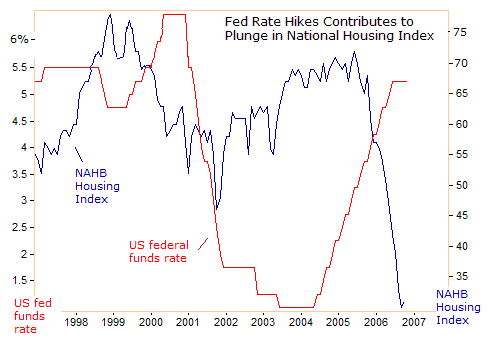
But can the Fed go beyond the Jawboning phase and raise interest further to combat the gold rally and rescue the US dollar? An outright decline in US housing prices of about 5% next year would reduce housing wealth by more than $1 trillion, and that could put a significant dent into consumer spending in 2007. Depending on which estimate you accept, US consumers extracted about $550 billion through cash-out refinancing against the inflated value of their homes in 2005.
By Gary Dorsch, Editor Global Money Trends newsletter
** To “Stay on Top of Volatile Markets”, consider a subscription to the Global Money Trends newsletter published around the 1st and 15th of each month in pdf format, and 20-25 pages in length. GMT collects a wide array of news and information from reputable sources, filters out the noise and distractions, and puts all the pieces of global economic puzzle together into coherent snapshot analyses, with lots of cool charts depicting the inter-relationships of markets and economies around the world.
Here's what you will receive with a subscription,
Insightful analysis and predictions of, (1) top stock market indexes around the world, and US-listed Exchange Traded Funds (ETF’s) and closed-end country funds. (2) Commodities such as crude oil, copper, gold, silver, the CRB index, and gold mining and oil company indexes. (3) Foreign currencies such as, the Australian dollar, British pound, Euro, Japanese yen, and Canadian dollar. ($) Libor interest rates, global bond markets and their central bank monetary policies.
A subscription to Global Money Trends is $120 US dollars per year for 24 issues, including access to all back issues. Click on the following hyperlink, to order now, http://www.sirchartsalot.com/newsletters.php
© 2005-2022 http://www.MarketOracle.co.uk - The Market Oracle is a FREE Daily Financial Markets Analysis & Forecasting online publication.



